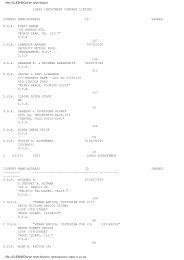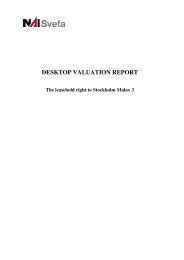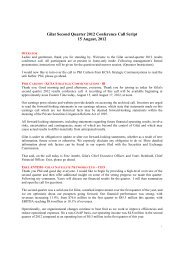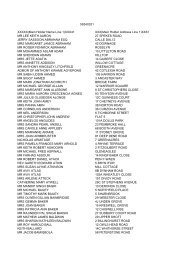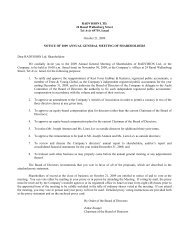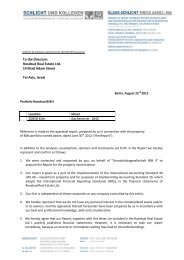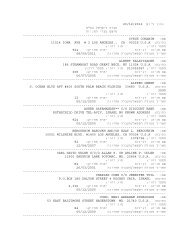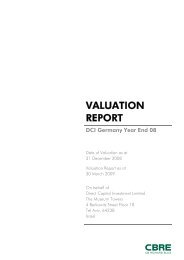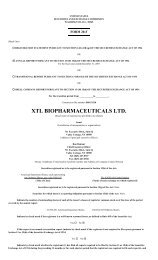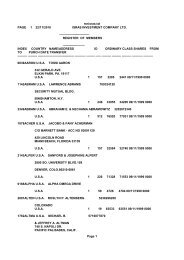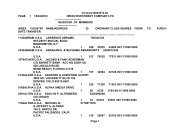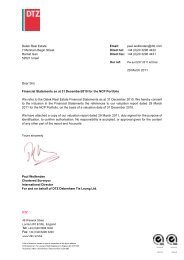RETALIX LTD.
RETALIX LTD.
RETALIX LTD.
Create successful ePaper yourself
Turn your PDF publications into a flip-book with our unique Google optimized e-Paper software.
Antitrust scrutiny of e-marketplace initiatives may adversely affect our business.<br />
The establishment and operation of e-marketplace initiatives may raise issues under various countries’ antitrust laws. To the extent that antitrust<br />
regulators take adverse action with respect to business-to-business e-commerce exchanges or establish rules or regulations governing these exchanges, or<br />
that there is a perception that regulators may do any of the foregoing, the establishment and growth of our e-marketplace initiatives may be delayed, which<br />
may adversely affect our business.<br />
Because we operate in international markets, we are subject to additional risks.<br />
We currently sell our software products and ASP services in a number of countries and we intend to enter additional geographic markets. Our business<br />
is subject to risks that often characterize international markets, including:<br />
potentially weak protection of intellectual property rights;<br />
economic and political instability;<br />
import or export licensing requirements;<br />
trade restrictions;<br />
difficulties in collecting accounts receivable;<br />
longer payment cycles;<br />
unexpected changes in regulatory requirements and tariffs;<br />
seasonal reductions in business activities in some parts of the world, such as during the summer months in Europe;<br />
fluctuations in exchange rates; and<br />
potentially adverse tax consequences.<br />
Our business and operating results could be harmed if we fail to protect and enforce our intellectual property rights.<br />
The laws of some countries in which our products are or may be developed, manufactured or sold may not protect our products or intellectual property<br />
rights, increasing the possibility of piracy of our technology and products. We currently have no patents or patent applications pending. We rely on a<br />
combination of trademarks, copyrights, trade secret laws, confidentiality procedures and licensing arrangements to protect our intellectual property rights.<br />
Our competitors could also independently develop technologies that are substantially equivalent or superior to our technology.<br />
It may be necessary to litigate to enforce our copyrights and other intellectual property rights, to protect our trade secrets or to determine the validity of<br />
and scope of the proprietary rights of others. Such litigation can be time consuming, distracting to management, expensive and difficult to predict. Our<br />
failure to protect or enforce our intellectual property could have an adverse effect on our business and results of operation.<br />
Our technology may infringe on the intellectual property rights of third parties and we may lose our rights to it, which would harm our<br />
business.<br />
We may be subject to infringement claims as the number of products and competitors in our industry segment grows and the functionality of products in<br />
different industry segments overlap. It is possible that we will inadvertently violate the intellectual property rights of other parties and that other parties will<br />
assert infringement claims against us. If we violate the intellectual property rights of other parties, we may be required to modify our products or<br />
intellectual property or obtain a license to permit their continued use. Any future litigation to defend ourselves against allegations that we have infringed<br />
the rights of others could result in substantial cost to us, even if we ultimately prevail, and a determination against us in any such litigation could subject us<br />
to significant liabilities to other parties and could prevent us from manufacturing, selling or using our products. If we lose any of our rights to our<br />
proprietary technology, we may not be able to continue our business.<br />
We have not yet completed the evaluation of our internal control over financial reporting in compliance with Section 404 of the Sarbanes-<br />
Oxley Act.<br />
We are required to comply with internal control evaluation and certification requirements of Section 404 of the Sarbanes-Oxley Act by no later then the<br />
end of our 2006 fiscal year. We are in the process of evaluating whether our existing internal control over financial reporting systems are compliant with<br />
Section 404. As a result of this evaluation, we may be required to implement new internal control procedures over financial reporting. We estimate that this<br />
process may take an additional several months to complete. We may experience higher than anticipated operating expenses and fees in this context and we<br />
may need to hire additional qualified personnel in order to achieve compliance with Section 404. If we are unable to implement these changes effectively<br />
or efficiently, it could harm our operations, financial reporting or financial results and could result in our being unable to obtain an unqualified report on<br />
internal controls from our independent auditors.<br />
12



